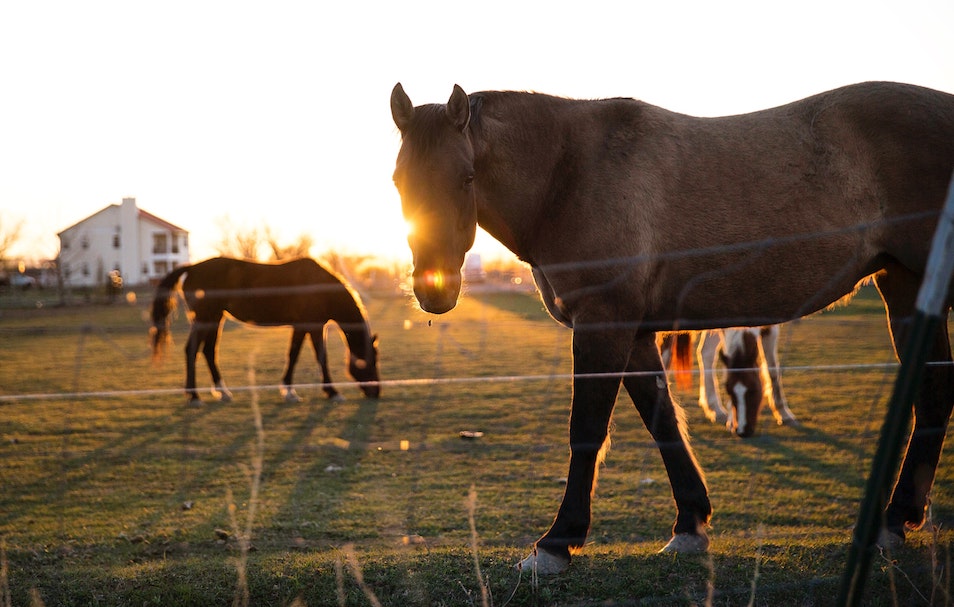Therapy can take place over phone, at your therapist’s office, and even at – a barn? While talk therapy can be a wonderful way to learn more about yourself and find relief, there are as many avenues towards healing as there are people. One of these is called Equine Assisted Psychotherapy (EAP), an umbrella term for mental health therapy involving horses. It differs from hippotherapy, which is a form of physical, occupational, or speech therapy that involves utilizing the natural gait and movement of a horse to provide motor and sensory input (Koca & Ataseven, 2016).
Equine Assisted Psychotherapy (EAP)
EAP is a form of experiential mental health treatment that involves interacting with horses. In general, no riding is involved. Horses are highly sensitive animals that can make great partners in therapy because they respond to nonverbal cues and can naturally sense where an individual is at emotionally in any given moment.
As predominantly flight animals that respond to sensation cues from the environment, horses are uniquely attuned to sensory stimuli. They are also expressive animals; unlike humans, who can “hide” what they are feeling, pretend to feel happy when they are actually sad, or feign a confidence that isn’t there, with horses what you see is generally a mirrored reflection of how that horse is feeling in any given moment. As such, the manner in which the horse responds can reflect areas of growth or opportunity for the individual interacting with them.
EAP falls under nonverbal ways of healing that are highly experiential. Not everyone is inclined to talk about their problems, and even those who do may not want to talk about them all the time. Therapy with horses means movement, physical activity, and active relationship building with the horses. These felt experiences help to promote engagement, especially for those who are hesitant to put their thoughts into words or who may tend to use words to disguise, distract, or deflect. Jennie Hegeman, an equine rehabilitation specialist, refers to horses as “1,200 pounds of lie detector” (Calico Junction).
EAP for Trauma & PTSD
While EAP has been widely applied to help individuals with anxiety, personal growth, and a range of other areas, an especially large amount of research and public attention has highlighted EAP for trauma-related symptoms and PTSD (e.g., Boss et al., 2019; Romaniuk et al., 2018). As herd animals that are highly attuned to cues of safety or fear, horses can offer individuals struggling with these areas a model of acceptance, self-reflection, and trust-based relationships. Put more plainly, horses will respond positively to positive emotions and negatively to negative emotions, regardless of their source. Individuals who are struggling with PTSD symptoms of shame, guilt, self-criticism or isolation often find that developing a trusting relationship with a horse is immensely healing and affirmative.
If this is an area of interest to you or your loved ones, check online for resources near you! Some of these programs are free for military, fire, police, and first responders (see “Flag Is Up Farms” below).
The EAGALA Model
Founded in 1999, EAGALA stands for the Equine Assisted Growth and Learning Association. They provide training for Mental Health Professionals and Equine Specialists and have a worldwide directory of certified therapeutic teams. In the video below, they talk about why they believe EAP works:
Next Steps
Many of us have longed to spend more time outdoors over the past year. If you are someone who finds solace in animals or nature, consider giving Equine Assisted Psychotherapy a try. There are many options!
While some facilities are on pause due to Covid-19, here are a few resources to keep in mind:
- Stand In Balance – Equine Assisted Psychotherapy in the Santa Monica Mountains, 45 minutes west of Los Angeles.
- Dream Catcher of Los Angeles – Equine Assisted Activities & Therapies in Long Beach, CA.
- Flag Is Up Farms – Horse Sense and Healing is a free, 3-day workshop for veterans, police, fire, and first responders, and their families who have been affected by Post Traumatic Stress Injury (PTSI). Located in Solvang, CA.
- EAGALA – Equine-Assisted Psychotherapy & Personal Development. Visit their website and click on “Find a Program” to locate an EAGALA-certified professional near you.
References
Boss, L., Branson, S., Hagan, H., & Krause-Parello, C. (2019). A Systematic Review of Equine-Assisted Interventions in Military Veterans Diagnosed with PTSD. Journal of Veterans Studies, 5(1), 23–33. DOI: http://doi.org/10.21061/jvs.v5i1.134
Calico Junction New Beginnings Ranch, Inc. Equine Therapy for Post Traumatic Stress Disorder (PTSD). http://www.calicojunctionnewbeginningsranch.org/ptsd.html
EAGALA. Meeting Mental Health Challenges in a Powerful Way: EAGALA Model Equine-Assisted Therapy. file:///Users/veronika/Downloads/meeting-mental-health-challenges-in-a-powerful-way.pdf
Koca, T. T., & Ataseven, H. (2016). What is hippotherapy? The indications and effectiveness of hippotherapy. Northern clinics of Istanbul, 2(3), 247–252. https://doi.org/10.14744/nci.2016.71601
Romaniuk, M., Evans, J., Kidd, C. (2018). Evaluation of an equine-assisted therapy program for veterans who identify as ‘wounded, injured or ill’ and their partners. PLoS ONE, 13(9): e0203943. https://doi.org/10.1371/journal.pone.0203943


